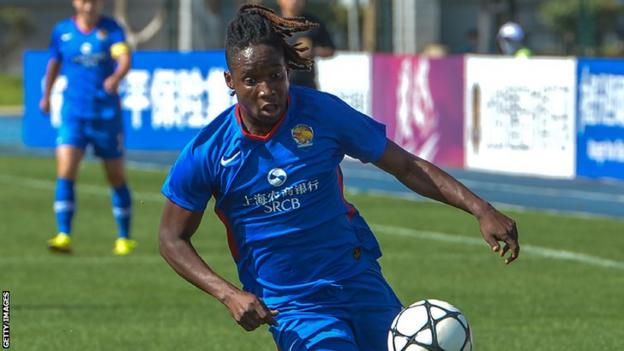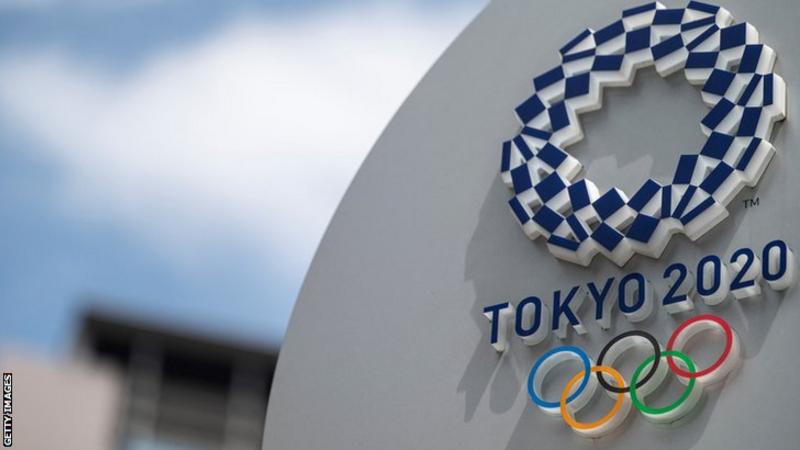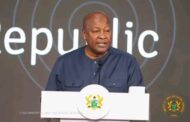When you are preparing to make your Olympic debut against women’s football heavyweights and European champions, smooth preparations would help – but Zambia’s Copper Queens have had anything but.
The team upset all odds to become Africa’s sole representative in Tokyo, defeating 2019 Women’s World Cup qualifiers Cameroon in the play-off to take the sought-after slot above even the might of Africa’s record nine-time champions Nigeria.
Zambia have run headlong into a wall of challenges since their memorable qualification in March 2020, and the fact they have played only one friendly since can be blamed on the vast obstacle presented by the ongoing coronavirus pandemic.
Nonetheless, the pre-tournament difficulties have done little to dampen enthusiasm, as team captain Barbra Banda – a forward who has also boxed professionally in the past – makes clear.
“It is so amazing and everyone is excited to represent the country – not just Zambia, but Africa at large,” she told BBC Sport Africa.
“It is a sign that women’s football in Zambia is going somewhere and we are improving each and every time.
“We are so happy as a team to represent the continent. It feels great because we worked so hard for it. I know we have a good team.”
That sole friendly – an impressive 2-1 victory against a Chilean side playing on home soil – came in December 2020, with a scheduled second game abruptly cancelled after several of the Zambia squad tested positive for Covid-19.
Cancelled tours
In February, the Copper Queens were then set to test themselves against strong opposition at an eight-team international tournament in Turkey only for more positive Covid tests in the squad to force their withdrawal prior to departure.
Their final roll of the dice was a tour to England in June, with a match against Great Britain the highlight, but once again coronavirus – or, more specifically, the travel restrictions it enforces – crushed those plans.

It leaves a team that defied the odds to just make it to the Olympic having to face two-time silver medallists Brazil, China (1996 runners-up) and European champions the Netherlands with only an intensive three-month training camp in Zambia to fall back on.
“The ideal situation would have been to test ourselves against strong teams,” lamented Zambia FA media liaison officer Sydney Mulenga.
“Obviously, you can’t substitute that level of competition with anything we have (in Zambia).”
Yet Banda, who finished top scorer in the China Women’s Super League last year, is unfazed by the might of Group F.
“I feel great because I always want to compete with the best, so I just have to go and prove myself there,” she rallied.
“It’s a tough group but we are not looking at the names of the teams – we are going there with our own aim and Zambians are expecting a lot from us.”
Inspiring the next generation
The Queens’ Olympic qualification has seen increased interest in women’s football in Zambia, where it is hoped that Tokyo 2020, and its qualifying campaign, can mark the beginning of real change for the game in the Southern African nation.
“Their success has opened many windows of opportunities for other girls,” explained Mulenga. “It has not been easy to get women to play football but the small steps they have made over time has inspired other girls to try football.
“The first time we were at the World Cup in 2014, for under-17 players, our girls were not well remunerated and some of them dropped out. The few that survived from then are now at least being given some level of support.
“I think some of these girls are supporting their families beyond what the men do in their households.”
“Our qualification means a lot – especially to the young ones coming up,” Banda agreed. “It puts the women’s league in country to another level. Everyone is fighting to find themselves at national level.”
“We just have to continue with this same pace so that we can do our level best and we are hoping to have many more professionals come up from our team.”
Banda aside, other squad players with international exposure include Hellen Mubanga, who plays for Spanish side Zaragoza, and Kazakhstan-based Rachael Kundanaji, who boasts experience in Europe’s Women’s Champions League, and first-choice goalkeeper Hazel Nali, who plays in Israel.
Having represented Zambia as an athlete at the 2008 Olympics in Beijing, Rachael Nachula had been hoping to make history by turning out for the football team in Tokyo but injury has dashed those aims.
Despite the regrettable preparations, the Copper Queens believe they can shine suitably bright in Tokyo.
“We are not scared of any team – we can beat them,” Florence Mwila, Zambia’s assistant coach, told BBC Sport Africa.
“I am very confident that we will not be knocked out in the group stage.”
The Copper Queens kick off their Olympic campaign against the Dutch on 21 July in Japan where they will be underdogs but whatever the results, qualification will be seen as a victory in Zambia for many years to come.
Source: BBC




















































